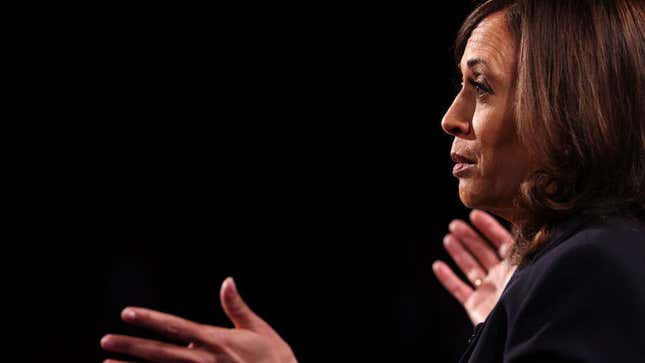Kamala Harris Deftly Avoided the Pitfalls History Set for Her
Politics

“I’m speaking,” Kamala Harris said twice during last night’s vice presidential debate. She said it to Vice President Mike Pence, who interrupted her early in the debate, shortly after moderator Susan Page asked her about coronavirus. (Page, incidentally, also interrupted Harris during this particular exchange). Harris’s matter of fact statement— “Mr. Vice President, I’m speaking”—underpinned last night’s debate, one that has been described by national publications as “civil” and a “return to a more traditional affair.”
If the debate was more “traditional” than last week’s anxiety-inducing Presidential debate, then part of that ease was the familiarity of watching Pence regularly interrupt—undoubtedly part and parcel of the Trump administration’s debate strategy. CBS reports that Pence interrupted Harris 10 times, twice as much as she interrupted him. Less familiar, however, was watching Harris advocate for herself throughout the night; watching her demand that both Page and Pence give her the speaking time allotted to her. She was successful at keeping her time, Harris spoke 35 minutes to Pence’s 38.
Simply existing in politics without falling into the thousands of s
Harris’s studied performance was so clearly the result of a lifetime of practice, of figuring out how to do that nearly impossible task of demanding without being demanding, of arguing without seeming angry, of simply existing in politics without falling into the thousands of stereotypes readily available to her opponents: the angry black woman, the hysteric, or the conniving backstabber. Those stereotypes are already familiar to Harris, coming to national prominence in the Trump era where crude, antiquated and racist depictions of gender are rich currency.
Shortly after her 2017 viral exchange with then-Attorney General Jeff Sessions during a Senate Intelligence Committee hearing, on-and-off Trump campaign advisor Jason Miller described Harris as “hysterical.” And, of course, since she was announced as Joe Biden’s running mate, Donald Trump has gone out his way to revive the nasty woman trope he employed against Hillary Clinton, updating it with the suggestion that Harris is really in control, conspiring to usurp the presidency from a vulnerable Biden. This morning, Trump turned to a new racialized insult, calling Harris a “monster.”
“This monster that was on stage with Mike Pence, who destroyed her last night by the way,” he said in a phone call to Fox News. He continued: “This monster she says, ‘No, no, there won’t be fracking, there won’t be this’ [….] Everything she said was a lie.”
The inevitable opinions of a President who revels in racism and sexism aside, Harris succeeded in an almost impossible task. She spoke about coronavirus with empathy that has been missing from our current leadership and spoke about George Floyd and Breonna Taylor with needed clarity. There were, inevitably, disappointing reminders of the center coalition that’s formed to back Biden’s campaign, from the full support of fracking to Harris distancing herself from the Green New Deal and reformist approach to policing. But Harris was there to act as a proxy for Biden and his potential administration, her “I’m speaking” a stark contrast to Biden’s “Will you shut up man?”
If both Harris and Pence were praised for their debate performance, their two tasks were wildly different. All Pence had to do was speak in a certain tone to be perceived as calm and professional. It simply didn’t matter if he said outrageous things, including falsely accusing Harris and Biden of supporting abortion to the moment of birth. It didn’t matter if Pence persistently interrupted Harris. Indeed Susan Page seemed to have only been capable of mustering the phrase “Thank you, Mr. Vice President,” in response.
All Pence had to do was not be Trump. He could, of course, say the same things, argue that the Trump administration has handled the coronavirus pandemic competently, he simply had to say them in a different tone. It’s, of course, a low bar, but it’s the one that’s historically been set for men. Harris’s approach to the debate came with a different set of expectations, a different history informing the interpretation of how she spoke, how much could speak and what she was allowed to say. It’s an ugly history that’s purposefully built on invisible traps and impossible demands. Harris managed to avoid them all, instead advocating for herself and for her right to be heard.